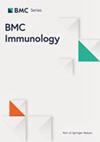作为免疫系统调节剂的螺旋藻衍生蛋白:对其缓解结肠炎前景的系统回顾
IF 2.9
4区 医学
Q3 IMMUNOLOGY
引用次数: 0
摘要
蠕虫衍生蛋白具有免疫调节特性,可影响宿主的免疫反应,是蠕虫生存的一种适应性策略。螺旋虫衍生蛋白通过诱导抗炎细胞因子、促进调节性T细胞发育以及最终有利于Th2偏向的免疫反应来调节免疫反应。本系统综述重点研究蠕虫衍生蛋白,探讨它们对减轻小鼠结肠炎模型炎症反应的影响。通过对 Medline、EMBASE、Web of Science 和 Cochrane 图书馆进行系统检索,发现了 14 项相关研究。这些研究报告了免疫调节变化,包括抗炎细胞和细胞因子产量的增加。在使用蠕虫衍生蛋白治疗结肠炎的小鼠模型中,与对照组相比,体重、结肠长度和显微炎症评分等病理参数都有显著改善。此外,蠕虫衍生蛋白还能增强Tregs的功能,减轻炎症的严重程度。这些发现强调了蠕虫衍生蛋白在免疫调节中的关键作用,特别是在细胞因子分泌和免疫细胞极化轴中的作用。这些发现为治疗克罗恩病等慢性炎症提供了新的机会。本文章由计算机程序翻译,如有差异,请以英文原文为准。
Helminth-derived proteins as immune system regulators: a systematic review of their promise in alleviating colitis
Helminth-derived proteins have immunomodulatory properties, influencing the host’s immune response as an adaptive strategy for helminth survival. Helminth-derived proteins modulate the immune response by inducing anti-inflammatory cytokines, promoting regulatory T-cell development, and ultimately favouring a Th2-biased immune response. This systematic review focused on helminth-derived proteins and explored their impact on reducing inflammatory responses in mouse models of colitis. A systematic search across Medline, EMBASE, Web of Science, and Cochrane Library identified fourteen relevant studies. These studies reported immunomodulatory changes, including increased production of anti-inflammatory cells and cytokines. In mouse models of colitis treated with on helminth-derived proteins, significant improvements in pathological parameters such as body weight, colon length, and microscopic inflammatory scores were observed compared to control groups. Moreover, helminth-derived proteins can enhance the function of Tregs and alleviate the severity of inflammatory conditions. The findings underscore the pivotal role of helminth-derived proteins in immunomodulation, specifically in the axis of cytokine secretion and immune cell polarization. The findings offer new opportunities for treating chronic inflammatory conditions such Crohn’s disease.
求助全文
通过发布文献求助,成功后即可免费获取论文全文。
去求助
来源期刊

BMC Immunology
医学-免疫学
CiteScore
5.50
自引率
0.00%
发文量
54
审稿时长
1 months
期刊介绍:
BMC Immunology is an open access journal publishing original peer-reviewed research articles in molecular, cellular, tissue-level, organismal, functional, and developmental aspects of the immune system as well as clinical studies and animal models of human diseases.
 求助内容:
求助内容: 应助结果提醒方式:
应助结果提醒方式:


